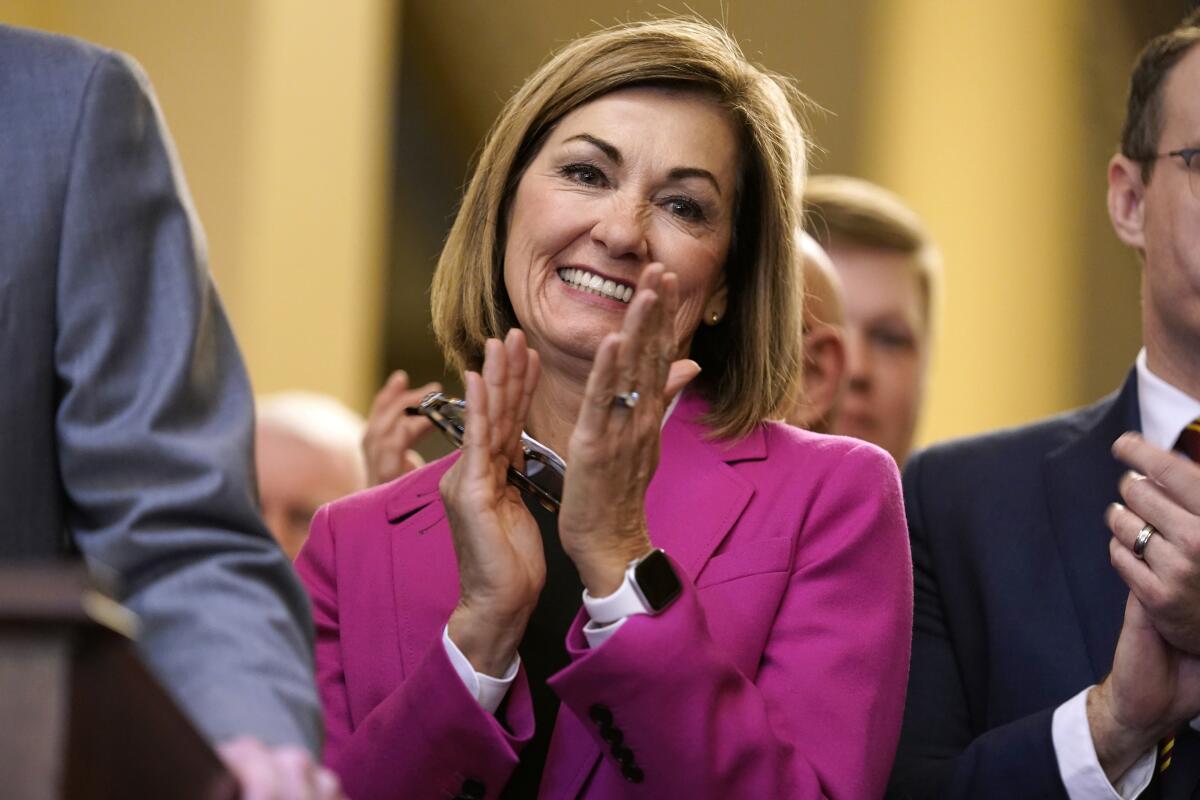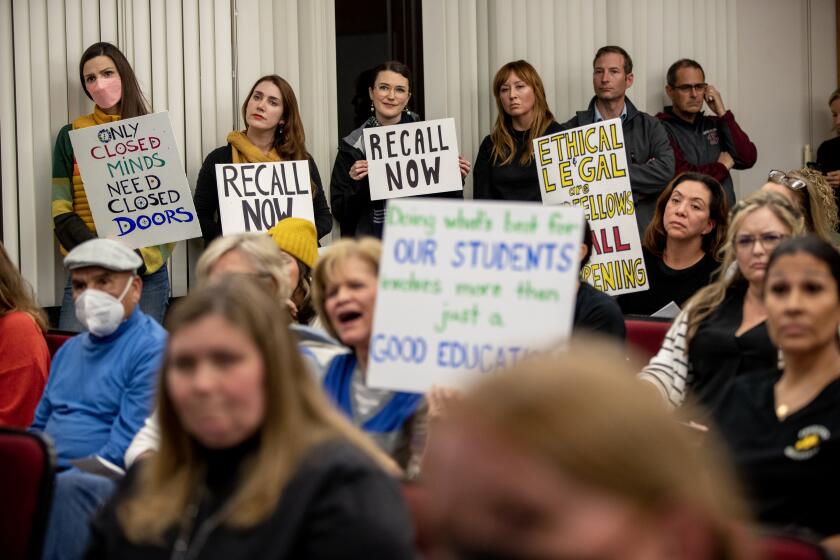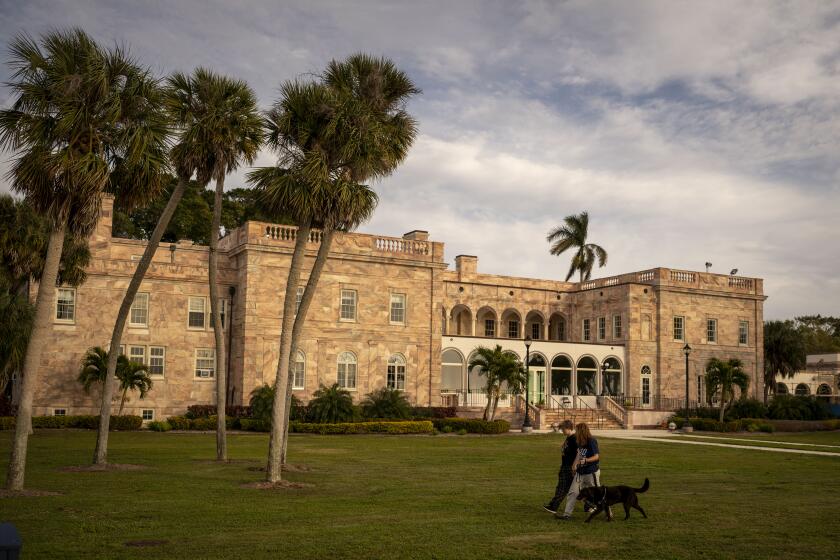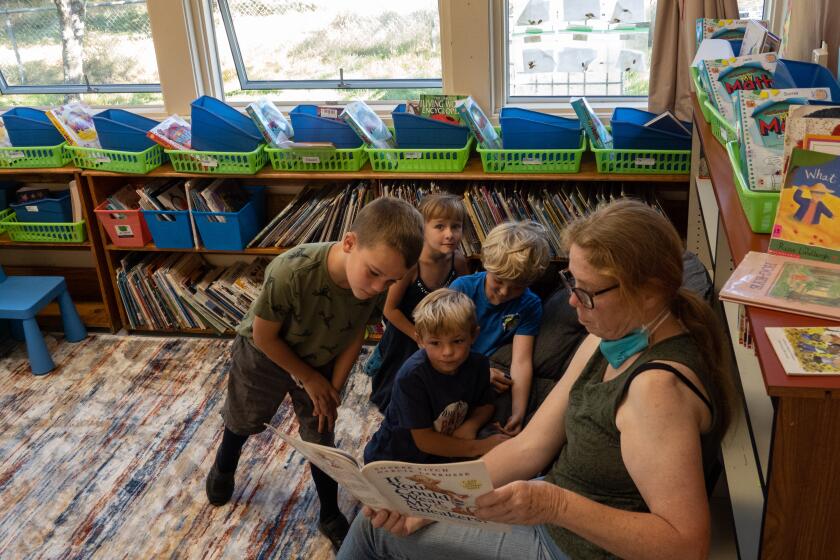Opinion: Your tax dollars for their private school? More and more states are saying yes

DES MOINES — If you’re attuned to the culture wars, you know that parental rights and anti-wokeness in education are powerful political messages now. The supposed presence of critical race theory in middle school, allowing trans kids to use bathrooms that match their gender identity, books that “groom” kids for any number of scary causes — these topics are frightening parents and bedeviling school boards and classrooms across the country.
In a blue state like California, the debates may seem too localized or too distant to matter. But the appeal of parental education rights shouldn’t be underestimated. Even levelheaded voters can be persuaded that public schools, and their pluralistic, secular values, aren’t about education but indoctrination.
Iowa, my home, is a case in point. And it could be a bellwether for a national movement that has schools and educators in its sights.
The new conservative majority on the Orange Unified school board has not stated a reason for the move, which was opposed by many parents and teachers.
A town hall gathering in Des Moines early this month was billed as a down-home event about “Giving Parents A Voice” and cheering Gov. Kim Reynolds’ signing of a “school choice” law on Jan. 24. The universal voucher plan, which Iowa was the third state to institutionalize (behind Arizona and West Virginia), will by year three allow any K-12 student in the state to switch from public school to private school with up to $7,600 a year in taxpayer funds to help pay the bill, regardless of family income. (Utah’s governor signed a similar law a week later; nearly a dozen other states are considering more voucher legislation.)
Curiously, not a single speaker at the town hall was invited to share their voice as an Iowa parent. The event sponsors were actually a Florida-based group, Moms for Liberty, and the Virginia-based Leadership Institute, with a starring role by D.C.-based self-described “school choice evangelist” Corey DeAngelis. He represented the libertarian Cato Institute and the American Federation for Children.
“For too long in K-through-12 education,” DeAngelis declared to applause, “only unions had special influence. But now the kids have a union of their own, and they’re called parents.” His educational goals? “Parental sovereignty and separation between child and the state.” It was a provocative play on words given that the separation between church and state is among the principles at risk in Iowa now. Iowa has few nonparochial private schools, so state money will fund the religious educations of most who leave public schools, if they’re accepted.
New College of Florida looks set to become a pivotal battleground over the mission of public universities as Gov. Ron DeSantis wages his war on ‘woke.’
Tax dollars now go to public schools that accept all comers and boast one of the best high school graduation rates in the country (a tick above 90%). Iowa high schoolers also post scores on the ACT that rank in the top three among states where nearly half (or more) students are tested. Ultimately under the school choice law, $345 million of education tax monies a year will subsidize schools that, for instance, require students to regularly only attend certain kinds of churches or, in the case of all 17 Catholic high schools in Des Moines, that forbid bathroom use or pronouns or dress codes that don’t align with a person’s gender at birth. Nor can the state set educational standards for private schools.
And the Legislature is also considering a flood of bills aimed at telling educators how to do their jobs. One bill would bar any talk of sexual orientation or gender identity in public schools. Another would require public colleges to report to the state what they teach on social justice. School districts would be compelled to notify parents if their children had expressed identification with another gender. Reynolds already signed a law, in 2021, barring critical race theory, and the discussions it might generate, from publicly funded Iowa schools and colleges, saying such teachings about slavery and racism might make white people feel guilty.
And yet this is not exactly who Iowans are. The state historically isn’t a conservative bastion, though its largely white and rural population might be considered change-averse. Still, power between the parties has been balanced. Republican Charles Grassley and Democrat Tom Harkin served in the U.S. Senate simultaneously for 30 years and in the House for six. Iowa was the third state to recognize same-sex marriage, the first to support Barack Obama’s presidential aspirations, and it gave us Nikole Hannah-Jones, Pulitzer Prize winning author of “The 1619 Project.” Polls show Iowans don’t support school vouchers.
The COVID-19 pandemic unexpectedly saved one of the smallest public schools in California, even as enrollment is plummeting elsewhere.
So why the tilt now? Iowans are susceptible to the pressures the whole nation faces: the misinformation industrial complex, the effectiveness of Trumpian rhetoric and divisiveness over wedge issues such as LGBTQ rights, immigration policy and guns, all of which Reynolds rode to victory, twice. Those pressures are exacerbated here by recent underfunding of the state’s solid school system, the shrinking of mainstream newspapers with statewide circulation, the popularity of right-wing talk radio and cable news, and a growing urban-rural divide.
On school vouchers, after earlier failures to pass milder bills, supporters changed the rules in the Legislature last month to ensure passage of Reynolds’ latest (and most aggressive) version of the policy. Some believe she has her eye on the presidency or a vice presidential position. Asked recently by a TV reporter if she and Florida Gov. Ron DeSantis had discussed her being on his ticket, Reynolds said they hadn’t. In fact, she said, she was competing with him for who could sooner fulfill certain objectives they share, like universal school vouchers, and she was winning.
There’s also speculation that private equity firms and hedge funds are interested in states’ school privatization efforts as those private school expansions could yield lucrative investments. Hundreds of thousands of out-of-state PAC dollars have been spent lobbying against Democratic Iowa candidates and in favor of using public money for private schools.
Whatever the forces at play in Iowa, with the signing of the school privatization bill three weeks into January’s legislative term, a deeper chill than the already hard freeze of winter is gripping many natives and transplants here. The hostile targeting of already disenfranchised groups, the state’s limits on what can be taught and read, the prospect of religious indoctrination affecting lowa’s long-exemplary educational achievements and the interests of unknown outside groups are the gathering clouds of a worrisome storm. Today Iowa, tomorrow who knows where?
Rekha Basu recently ended a 30-year career as opinion columnist at the Des Moines Register. She is co-hosting the soon-to-launch podcast series “What the Hell Happened to Iowa?”
More to Read
A cure for the common opinion
Get thought-provoking perspectives with our weekly newsletter.
You may occasionally receive promotional content from the Los Angeles Times.













